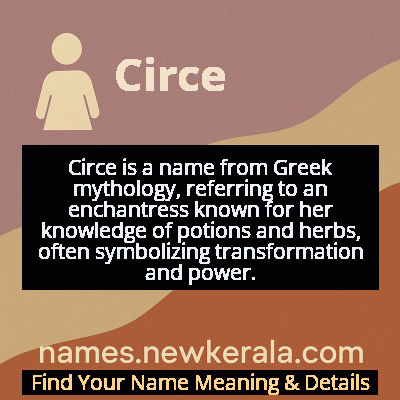Circe Name Meaning & Details
Origin, Popularity, Numerology Analysis & Name Meaning of Circe
Discover the origin, meaning, and cultural significance of the name CIRCE. Delve into its historical roots and explore the lasting impact it has had on communities and traditions.
Name
Circe
Gender
Female
Origin
Greek
Lucky Number
2
Meaning of the Name - Circe
Circe is a name from Greek mythology, referring to an enchantress known for her knowledge of potions and herbs, often symbolizing transformation and power.
Circe - Complete Numerology Analysis
Your Numerology Number
Based on Pythagorean Numerology System
Ruling Planet
Moon
Positive Nature
Diplomatic, friendly, artistic, empathetic.
Negative Traits
Over-sensitive, moody, indecisive, prone to self-pity.
Lucky Colours
Green, cream, white.
Lucky Days
Monday.
Lucky Stones
Pearl, moonstone.
Harmony Numbers
1, 3, 4.
Best Suited Professions
Diplomats, mediators, caregivers, artists.
What People Like About You
Cooperative spirit, friendliness, artistic talent.
Famous People Named Circe
Circe (Mythological)
Goddess/Sorceress
Central figure in Homer's Odyssey who transformed men into animals and guided heroes
Circe Maia
Visual Artist
Contemporary Brazilian artist known for exploring feminine power through mixed media
Circe Link
Musician/Songwriter
American singer known for retro-pop style and musical collaborations
Circe Sturm
Anthropology Professor
Academic and author specializing in Native American studies and racial identity
Name Variations & International Equivalents
Click on blue names to explore their detailed meanings. Gray names with will be available soon.
Cultural & Historical Significance
Extended Personality Analysis
The name Circe evokes a personality profile marked by intelligence, independence, and transformative power. Those bearing this name are often perceived as possessing keen intuition and psychological insight, able to see through superficial appearances to understand people's true motivations. They typically exhibit strong willpower and self-possession, refusing to be defined by others' expectations. Like the mythological Circe who turned men into their essential animal forms, modern Cirees often have a talent for revealing hidden truths and facilitating personal transformations in those around them. There's frequently an artistic or creative dimension to their personality, combined with strategic thinking and the ability to influence their environment. While they can appear intimidating or mysterious to others, this often masks deep loyalty and protective instincts toward chosen companions. The name suggests someone comfortable with complexity and contradiction—able to be both gentle and formidable, independent and deeply connected, traditional and revolutionary. This psychological richness makes Circe a name associated with depth, wisdom, and the courage to embrace one's full power.
Modern Usage & Popularity
In contemporary naming practices, Circe represents a sophisticated choice for parents seeking mythological names with literary pedigree and feminist resonance. While still relatively rare, its usage has been steadily increasing, particularly among educated urban professionals who value classical references and strong female archetypes. The name's popularity received significant boosts from Madeline Miller's bestselling 2018 novel and growing interest in mythological names that offer alternatives to more common classical choices like Athena or Diana. Current naming data shows Circe appearing more frequently in birth announcements and social media, though it remains outside the top 1000 names in most English-speaking countries. Its appeal lies in its combination of ancient heritage and modern relevance—it sounds contemporary while carrying millennia of cultural weight. Parents choosing this name often appreciate its association with intelligence, independence, and complex femininity, seeing it as empowering rather than the negative characterization sometimes present in traditional interpretations. The name works particularly well in multicultural settings where its classical roots are appreciated but its sound remains accessible.
Symbolic & Spiritual Meanings
Circe's symbolic meanings encompass transformation, feminine power, and the revelation of essential truths. Her mythological role as a transformer of men into animals represents the idea that circumstances and relationships can strip away social artifice to reveal fundamental nature. She symbolizes the 'pharmakon' principle—that which can both harm and heal—embodying the dual nature of knowledge, power, and influence. Her island domain represents sacred space where conventional rules don't apply and radical transformation becomes possible. Modern symbolic interpretations often focus on Circe as an emblem of reclaimed female agency—a figure historically portrayed as dangerous precisely because she wielded power outside patriarchal control. She represents the wisdom that comes from embracing aspects of oneself that society might label monstrous or threatening. The circular symbolism in her name (from possible connections to 'circle' or 'circuit') suggests cycles of transformation, wholeness, and the integration of opposing forces. Contemporary feminist readings see her as symbolic of women's right to define their own narratives and exercise power on their own terms, making her an increasingly relevant symbol in discussions about gender, agency, and personal transformation.

